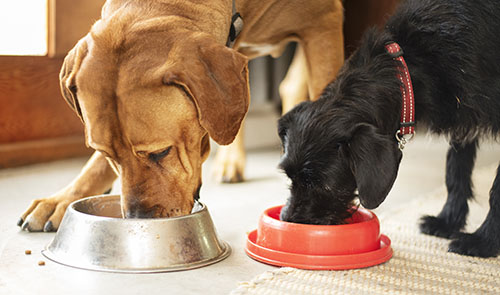Is Grain-Free Dog Food Really Grain Free?
Feb 28, 2022

A healthy dog starts with a well-balanced diet. However, very few pet owners take the time to look at the ingredients in their pet’s food and understand the role that each one plays in their animal’s overall health.
Grain-free dog food has been the most popular and debated food trend of the past several years. After all, our dog’s primal ancestors only ate meat, right? What many pet owners don’t consider, though, is that domesticated dogs have adapted over the years to be able to digest larger amounts of grains and gluten. In other words, including grains in your dog’s diet is not as bad as you may think.
The important thing to remember is that your dog’s diet should be well-balanced and nutritionally sound, no matter if it contains grains or not. Cutting out all grain from a dog’s diet, though, can actually cause them to miss out on necessary fiber, fatty acids, and protein. They need healthy, whole grains to keep their digestive system running smoothly.
A common misconception is that a grain-free diet replaces grain with more meat. This is typically far from the truth, though. Grain-free diets could actually be increasing your dog’s carb intake. Many grain-free dog foods merely substitute grains such as wheat and rice for alternative carbohydrate sources, usually in the form of legumes like peas and lentils.
These substitutes do not actually offer any greater nutritional value than the grains they are replacing and have been known to actually cause a condition known as dilated cardiomyopathy (DCM). DCM can cause the heart to become enlarged and stifle its ability to properly pump blood throughout the body. This will eventually lead to heart murmurs, exercise intolerance, or congestive heart failure. Fortunately, the symptoms of DCM have been known to be partially reversed when the diet is changed back to a grain-inclusive food.
If your dog has a grain allergy, a grain-free food would certainly be an appropriate choice. However, most dogs do not suffer from a grain allergy. In fact, allergies to proteins and dairy are far more common. If you feel as though your dog is suffering, your local veterinarian can conduct a food trial to determine what type of food is most beneficial for your pet.
Your local Co-op carries numerous high-quality dog food brands that we believe are a healthy choice for your pet. Stop by the store to pick up a bag!
For more content like this, check out the latest issue of the Cooperator.
Grain-free dog food has been the most popular and debated food trend of the past several years. After all, our dog’s primal ancestors only ate meat, right? What many pet owners don’t consider, though, is that domesticated dogs have adapted over the years to be able to digest larger amounts of grains and gluten. In other words, including grains in your dog’s diet is not as bad as you may think.
The important thing to remember is that your dog’s diet should be well-balanced and nutritionally sound, no matter if it contains grains or not. Cutting out all grain from a dog’s diet, though, can actually cause them to miss out on necessary fiber, fatty acids, and protein. They need healthy, whole grains to keep their digestive system running smoothly.
A common misconception is that a grain-free diet replaces grain with more meat. This is typically far from the truth, though. Grain-free diets could actually be increasing your dog’s carb intake. Many grain-free dog foods merely substitute grains such as wheat and rice for alternative carbohydrate sources, usually in the form of legumes like peas and lentils.
These substitutes do not actually offer any greater nutritional value than the grains they are replacing and have been known to actually cause a condition known as dilated cardiomyopathy (DCM). DCM can cause the heart to become enlarged and stifle its ability to properly pump blood throughout the body. This will eventually lead to heart murmurs, exercise intolerance, or congestive heart failure. Fortunately, the symptoms of DCM have been known to be partially reversed when the diet is changed back to a grain-inclusive food.
If your dog has a grain allergy, a grain-free food would certainly be an appropriate choice. However, most dogs do not suffer from a grain allergy. In fact, allergies to proteins and dairy are far more common. If you feel as though your dog is suffering, your local veterinarian can conduct a food trial to determine what type of food is most beneficial for your pet.
Your local Co-op carries numerous high-quality dog food brands that we believe are a healthy choice for your pet. Stop by the store to pick up a bag!
For more content like this, check out the latest issue of the Cooperator.